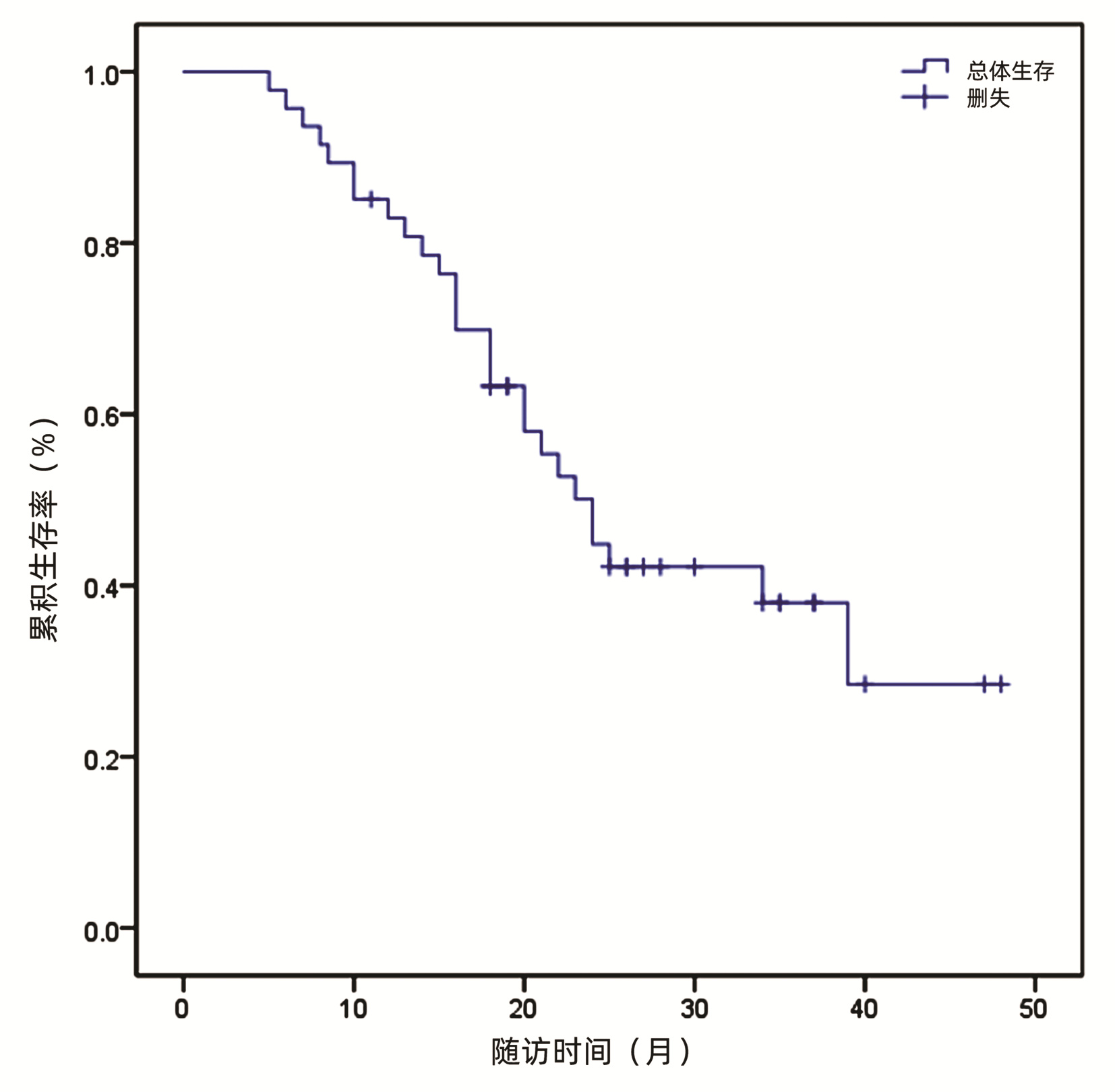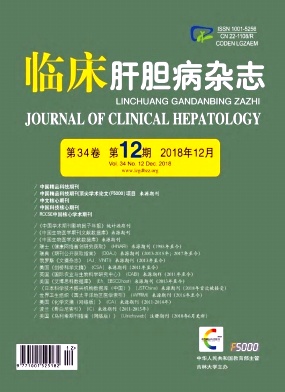|
[1] SIEGEL RL, MILLER KD, JEMAL A. Cancer statistics, 2016[J]. CA Cancer J Clin, 2016, 66 (1) :7-30.
|
|
[2] KANAS GP, TAYLOR A, PRIMROSE JN, et al. Survival after liver resection in metastatic colorectal cancer:Review and meta-analysis of prognostic factors[J]. Clin Epidemiol, 2012, 4:283-301.
|
|
[3] van CUTSEM E, CERVANTES A, ADAM R, et al. ESMO consensus guidelines for the management of patients with metastatic colorectal cancer[J]. Ann Oncol, 2016, 27 (8) :1386-1422.
|
|
[4] BAI H, HUANGZ X, JING L, et al. The effect of radiofrequency ablation vs. liver resection on survival outcome of colorectal liver metastases (CRLM) :A meta-analysis[J]. Hepatogastroenterology, 2015, 62 (138) :373-377.
|
|
[5] LIANG RF, ZHENG LL. The efficacy and safety of panitumumabin the treatment of patients with metastatic colorectal cancer:A meta-analysis from five randomized controlled trials[J]. Drug Des Devel Ther, 2015, 9:4471-4478.
|
|
[6] YAMAZAKI K, NAGASE M, TAMAGAWA H, et al. Randomized phase III study of bevacizumab plus FOLFIRI and bevacizumab plus m FOLFOX6 as first-line treatment for patients with metastatic colorectal cancer (WJOG4407G) [J]. Ann Oncol, 2016, 27 (8) :1539-1546.
|
|
[7] van CUTSEM E, LENZ HJ, KOHNE CH, et al. Fluorouracil, leucovorin, and irinotecan plus cetuximab treatment and RAS mutations in colorectal cancer[J]. J Clin Oncol, 2015, 33 (7) :692-700.
|
|
[8] PETRELLI F, BARNI S. Resectability and outcome with anti-EGFR agents in patients with KRAS wild-type colorectal liver-limited metastases:A meta-analysis[J]. Int J Colorectal Dis, 2012, 27 (8) :997-1004.
|
|
[9] RUERS T, PUNT C, van COEVORDEN F, et al. Radiofrequency ablation combined with systemic treatment versus systemic treatment alone in patients with non-resectable colorectal liver metastases:A randomized EORTC Intergroup phase II study (EORTC 40004) [J]. Ann Oncol, 2012, 23 (10) :2619-2626.
|
|
[10] LI S, HE N, LI W, et al. Debulking treatment with CT-guided percutaneous radiofrequency ablation and hepatic artery infusion of floxuridine improves survival of patients with unresectable pulmonary and hepatic metastases of colorectal cancer[J]. Chin J Cancer, 2014, 33 (6) :295-305.
|
|
[11] BOAME N, GRESHAM G, JONKER D, et al. Use of chemotherapy and radiofrequency ablation to treat colorectal cancer metastases:A retrospective review of The Ottawa Hospital Cancer Centreover 7years[J]. Curr Oncol, 2014, 21 (4) :e557-e563.
|
|
[12] LUO HY, LI YH, WANG W, et al. Single-agent capecitabine as maintenance therapy after induction of XELOX (or FOLFOX) in firstline treatment of metastatic colorectal cancer:Randomized clinical trial of efficacy and safety[J]. Ann Oncol, 2016, 27 (6) :1074-1081.
|
|
[13] BENDELL JC, ZAKARI A, PEYTON JD, et al. A phase II study of FOLFOXIRI plus panitumumab followed by evaluation for resection in patients with metastatic KRAS wild-type colorectal cancer with liver metastases only[J]. Oncologist, 2016, 21 (3) :279-280.
|
|
[14] LEONE F, ARTALE S, MARINO D, et al. Panitumumab in combination with infusional oxaliplatin and oral capecitabine for conversion therapy in patients with colon cancer and advanced liver metastases. The Meta Pan study[J]. Cancer, 2013, 119 (19) :3429-3435.
|
|
[15] TAKAHASHI T, SHIBATA Y, TOJIMA Y, et al. Multicenter phase II study of modified FOLFOX6 as neoadjuvant chemotherapy for patients with unresectable liver-only metastases from colorectal cancer in Japan:ROOF study[J]. Int J Clin Oncol, 2013, 18 (2) :335-342.
|
|
[16] FATOUROU EM, KOSKINAS JS. Adaptive immunity in hepatocellular carcinoma:Prognostic and therapeutic implications[J]. Expert Rev Anticancer Ther, 2009, 9 (10) :1499-1510.
|
|
[17] ALESSANDRO Z, MASSIMO P, AMALIA P, et al. Radiofrequency thermal ablation hepatocellular carcinoma liver nodules responses[J].Cancer Res, 2006, 66 (23) :1139-1146.
|
|
[18] ZERBINI A, PILLI M, FAGNONI F, et al. Increased immunostimulatory activity conferred to antigen-presenting cells by exposure to antigen extract from hepatocellular carcinoma after radiofrequency thermal ablation[J]. J Immunother, 2008, 31 (3) :271-282.
|
|
[19] ZERBINI A, PILLI M, LACCABUE D, et al. Radiofrequency thermal ablation for hepatocellular carcinoma stimulates autologous NK-cell response[J]. Gastroenterology, 2010, 138 (5) :1931-1942.
|
|
[20] HOF J, WERTENBROEK MW, PEETERS PM, et al. Outcomes after resection and/or radiofrequency ablation for recurrence after treatment of colorectal liver metastases[J]. Br J Surg, 2016, 103 (8) :1055-1062.
|
|
[21] HUANG CJ, TENG HW, CHIEN CC, et al. Prognostic significance of C-reactive protein polymorphism and KRAS/BRAF in synchronous liver metastasis from colorectal cancer[J]. PLo S One, 2014, 8 (6) :e65117.
|
|
[22] ASGHAR U, HAWKES E, CUNNINGHAM D. Predictive and prognostic biomarkers for targeted therapy in metastatic colorectal cancer[J]. Clin Colorectal Cancer, 2010, 9 (5) :274-281.
|
|
[23] CLANCY C, BURKE JP, KALADY MF, et al. BRAF mutation is associated with distinct clinicopathological characteristics in colorectal cancer:A systematic review and meta-analysis[J]. Colorectal Dis, 2013, 15 (12) :e711-e718.
|
|
[24] ACCIUFFI S, MEYER F, BAUSCHKE A, et al. Analysis of prognostic factors after resection of solitary liver metastasis in colorectal cancer:A22-year bicentre study[J]. J Cancer Res Clin Oncol, 2018, 144 (3) :593-599.
|
|
[25] DING XY, CHEN JL, SUN W, et al. Safety and efficacy of lowdose IL-2 plus transcatheter arterial chemoembolization followed by immediate radiofrequency ablation for the treatment of large primary liver cancer:A single-center experience[J]. Clin Med J, 2014, 12 (3) :22-28. (in Chinese) .丁晓燕, 陈京龙, 孙巍, 等.低剂量白介素-2联合肝动脉化疗栓塞术序贯CT引导下射频消融术在≥5 cm的原发性肝癌的疗效和安全性[J].临床药物治疗杂志, 2014, 12 (3) :22-28.
|
|
[26] FRANCICA G, PETROLATI A, DI-STASIO E, et al. Effectiveness, safety, and local progression after percutaneous laser ablation for hepatocellular carcinoma nodules up to 4 cm are not affected by tumor location[J]. AJR Am J Roentgenol, 2012, 199 (6) :1393-1401.
|









 下载:
下载:






 DownLoad:
DownLoad: